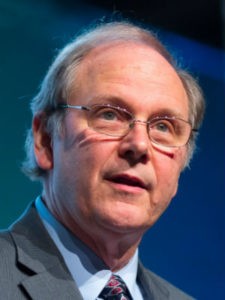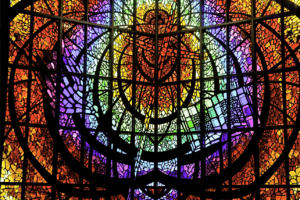 What prompted the Feb. 7 decision that Hardin-Simmons University’s Logsdon Seminary must be closed? And that HSU’s School of Theology – imagined and underwritten by the Logsdon family in 1983 – should be subsumed within the College of Liberal Arts as but one department among several other disciplines, including criminal justice, sociology, communication, history and English?
What prompted the Feb. 7 decision that Hardin-Simmons University’s Logsdon Seminary must be closed? And that HSU’s School of Theology – imagined and underwritten by the Logsdon family in 1983 – should be subsumed within the College of Liberal Arts as but one department among several other disciplines, including criminal justice, sociology, communication, history and English?
University officials say the primary reason is financial.
According to HSU President Eric Bruntmyer, the trustees’ approval of shuttering the seminary is the logical outgrowth of a “strategic financial plan” named “The Way Forward” that will enable the Texas Baptist school to “pursue financial excellence, which will allow (it) to maintain (its) academic excellence.” While true that the university faces some financial challenges, to identify money as the factor that forced the seminary’s closing is a smokescreen that hides the real motive.
Ironically, some suggest this action will actually attract more students to HSU. With Logsdon gone, President Bruntmyer predicts “students will continue to participate in chapel services and weekly Bible studies. They will have expanded opportunities to participate in ministry events locally and abroad and to take additional Bible courses.”
“Closing Logsdon is an achievement that fundamentalist foes of the seminary have dreamed of and worked toward for many years.”
Justifying the closing of the seminary and silencing its profound theological witness – while simultaneously suggesting that continued chapel services, weekly Bible studies and expanded ministry events can replace the depth of the seminary’s instruction and training for Christian ministry – is a fallacious argument.
Some HSU opponents, and even a few followers, have suggested that the trustees’ decision is “a God thing.” This simplistic, pious cliché can’t explain and certainly doesn’t justify the broken hearts of Logsdon alumni, students and current and former faculty, the damaged reputation and legacy of the institution, the lost opportunities for its continued service in the world, or the abrupt ending to something enormously good. To ascribe this hurtful and wrongheaded action to the inexplicable, divine will of God is a ludicrous and theologically naïve explanation.
In my mind, none of these rationales get to the heart of this stunning decision. Closing Logsdon is an achievement that fundamentalist foes of the seminary have dreamed of and worked toward for many years.
Conservative Texas Baptist pastors, in particular, have bristled at the support and prominence Logsdon has given to women ministers.
They and other critics have faulted Logsdon for exposing students to the beliefs and practices of religious Others, engaging in efforts of dialogue and mutual learning, rather than in strategies for conversion. They have objected when people outside Christianity, such as Imam Zia, a Muslim apologist and author; Marc Ellis, a non-Zionist Jewish intellectual; and Arun Gandhi, the Mahatma’s grandson and a Hindu peacemaker; have been invited to the campus to speak in Logsdon-sponsored programs.
These detractors, including leaders of the Baptist General Convention of Texas (rebranded as Texas Baptists), have grimaced when Logsdon refused to take a public stand against same-sex marriage or condemn LGBTQ Christians who desire to explore how they might serve the Christ they follow.
And they have worried because Logsdon professors have provided safe spaces for students to struggle with doubt, wrestle with non-traditional theological ideas or value orthopraxy (conduct) over orthodoxy (doctrine).
Like 21st-century Pharisees, these fearful fundamentalists have gathered their robes of holiness about them and conspired to attack this seminary. Most recently, the senior pastors of three prominent West Texas Baptist churches, along with the executive director of Texas Baptists and HSU’s president, determined to persuade enough trustees that Logsdon was infected and had to be terminated.
These critics and opponents – who worked publicly and behind the scenes to undermine Logsdon and its future as a seminary that was committed to loving God with one’s mind, as well with one’s heart and soul – have now won. Their strategy succeeded.
“Like 21st-century Pharisees, these fearful fundamentalists have gathered their robes of holiness about them and conspired to attack this seminary.”
Consequently, late on a Friday night, Bruntmyer sent a letter to the HSU family, knowing the trustees’ vote to close Logsdon would create tremendous backlash. Perhaps that is why he put the announcement in the fourth paragraph, only after touting some signs of the university’s success apparently designed to present uplifting counterbalance. Was it only coincidental that the university president couched his shockingly bad news in familiar and comforting religious jargon?
Please hear me clearly. I do not wish to imply that this spiritualizing language was contrived. I believe it was an honest reflection of Bruntmyer’s Christian faith. Nonetheless, repeatedly and insistently, the letter highlighted buzz phrases, stating that the trustees are leading HSU to sustain its “legacy of providing an education enlightened by Christian faith and values,” increasing the university’s emphasis on its “historic mission of providing Christian education across the undergraduate curriculum,” and pledging that Hardin-Simmons will “continue to hold to the Christian values on which it was founded.”
What I do question is the wisdom of this decision, regardless of how others might believe it supports the purpose of the university. It seems unethical and disingenuous to have introduced this proposal to the board without the full awareness and advance preparation of all the trustees and Logsdon’s leadership, or to have rushed to decision rather than deferring the recommendation for further, careful study.
Thus, to challenge any view that the vote to close the seminary was taken quickly or unthinkingly, Bruntmyer stressed that the trustees “made these decisions with prayerful consideration and spiritual discernment.” Ostensibly, those who oppose a decision will less likely question underlying motives and inevitable consequences when it is dressed in piety, moralizing and spirituality.
Even so, I am among those alumni, donors, former seminary employees, congregational leaders and other faithful Logsdon supporters across Texas Baptist life who question the action of the university’s trustees and its president. As a full professor of theology and missions who spent 18 years teaching at Logsdon Seminary, I am skeptical. That said, what I have written here is my own opinion, crafted without consultation with any current faculty member or board insider.
For readers unfamiliar with Logsdon Seminary’s history, the seminary’s website provides helpful context. It is enough, simply, for me to point out that the multi-million dollar endowment, given by Koreen Logsdon to honor the memory of her husband, Charles Logsdon, was “the largest gift in the university’s history” when it was donated in 1983 to establish the Logsdon School of Theology, of which the seminary is a vital part.
For almost 25 years, Logsdon has provided a community of learning and life transformation. In an open-minded and warm-hearted atmosphere, students and professors together have considered the biblical, theological and practical questions that undergird and guide effective ministry. Seminar rooms and student-faculty lounges have been spaces where disparate ideas could be expressed and valued. Faculty scholar-practitioners have taught students how to think rather than what to think, recognizing that learning happens in the classroom but also in the everyday context of friendship and mentoring.

Logsdon Seminary chapel window
The serene chapel, with its magnificent stained-glass window, has enabled multiple generations of students to experience that deeply personal encounter with the risen Christ and thus to hear the challenging call to “take care of the little ones.”
In summary, Logsdon’s interactive and relational approach has created an arena where ethnic, cultural, theological, and personal diversity, multi-faceted calling, fearless intellectual exploration, distinct and multiple avenues of ministry, cross-cultural appreciation and unapologetic respect for difference are cherished benchmarks of a Logsdon education. Over the years, some 400 graduates have gone out into the world as the voice, the hands and feet, the mind and the heart of Christ.
The decision to shut Logsdon’s doors was a tragic breaking of faith with this generous family who envisioned what the fruit of their lives could provide, in perpetuity, for young disciples of Christ preparing to work for his kingdom.
Since word of its closing has been made public, many seminary graduates have expressed their heartbreak, disillusionment, anger, confusion, numbness and sense of betrayal through letters and social media posts. They have spoken of Logsdon as “a beacon of light in a shadowy world.” They have described the seminary’s halls and classrooms as “sacred” spaces where they “learned how to do the hard work of caring for souls.” They have identified Logsdon as “the first place [where they were] ever encouraged to be thoughtful about matters of faith.” And they have explained that in this flourishing garden of theological gestation, they determined never “to sacrifice [their] allegiance to Jesus Christ for the sake of political or financial gain.”
It’s possible that I have misconstrued what led to this decision by the HSU board of trustees. But hearing such feedback from friends whose lives are in turmoil, I could not be more certain of this action’s aftermath: broken commitments and wounded spirits.
– Sellers is professor of theology emeritus and Connally chair of missions emeritus at Logsdon Seminary, where he served from 1998-2016. He and his wife, Janie, were missionary teachers in Indonesia for nearly 25 years. He was chair of the Parliament of the World’s Religions, the world’s oldest international, interfaith organization, based in Chicago, from 2016-2018.
EDITOR’S NOTE: This is the second of two commentaries on the decision to close Logsdon Seminary. BNG invited Hardin-Simmons’ leadership to submit an opinion article or a letter to the editor to express the view of the school’s president or trustees. As of Feb. 13, we had not received a response.
Related commentary:
Jonathan Davis | Logsdon Seminary will be shuttered: 7 Questions for Hardin-Simmons University’s president and trustees
